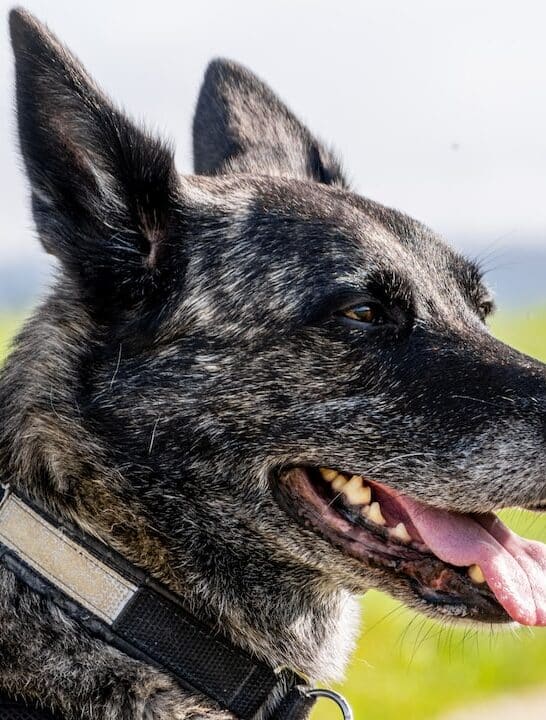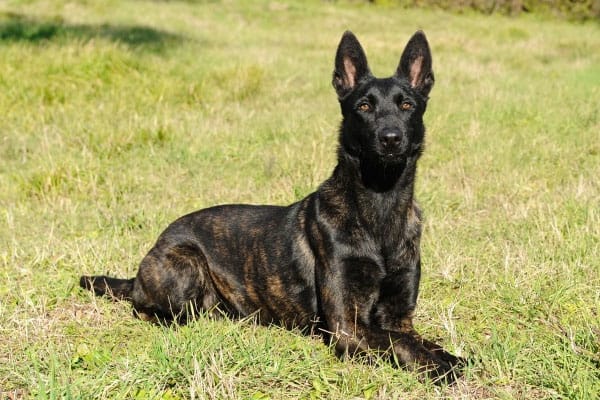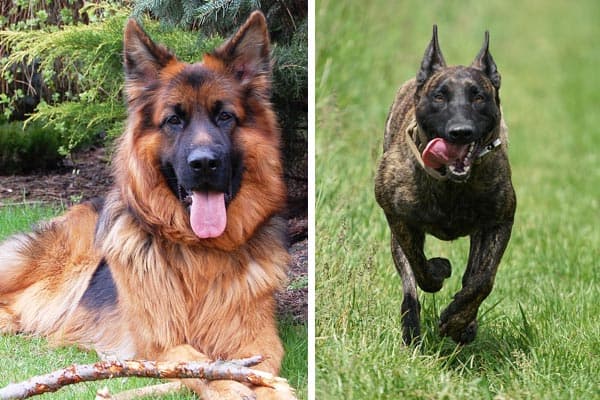Are Dutch Shepherds Good With Cats: the Truth About Cats and Dutch Shepherd Dogs
Sometimes it seems as though dogs and cats have been mortal enemies since the earliest days. And then other times you hear heart-warming stories of dogs and cats becoming best friends.
It is hard to know in advance whether a new dog will bond with an existing feline or vice versa.
And this is a very important concern to think through before you add a new animal of any breed or species to your family!
Do Dutch Shepherds get along with cats? Can this dog breed be trusted around cats and other pets in general?
The answer is more no than yes as you will soon see, although the potential is there to socialize the two species so they might get along.
In this article, we will give you the level of truth about Dutch Shepherds and cats from the perspective of dog experts and Dutch Shepherd owners.
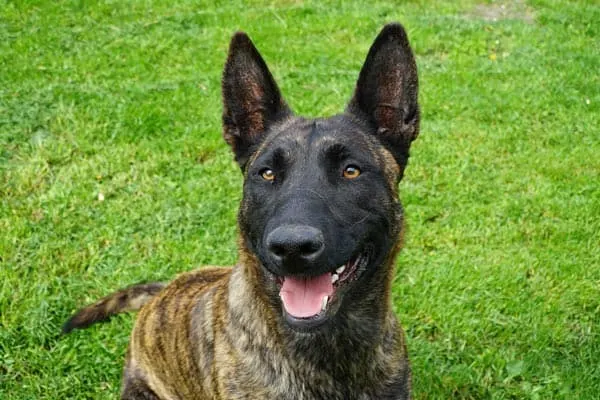
Are Dutch Shepherds Good With Cats?
Dutch Shepherds are a natural breed of dogs that was discovered by modern dog fanciers sometime in the early 20th century.
According to the American Kennel Club (AKC), this breed takes half its name from its homeland in The Netherlands and half its name from the work it has evolved to do – herding livestock.
While these dogs are not especially large on the outside, weighing anywhere from 42 to 75 pounds in adulthood, they are definitely outsized in personality and prey drive.
Dutch Shepherds are a true-blue working dog breed. They have never known the pet life in the modern sense of the word because their personality cannot tolerate a life of leisure.
Dutch Shepherd dogs are happiest when they can spend their days running and herding and chasing and guarding and using all of their senses and tremendous athletic talent in their job.
Because of this, Dutch Shepherds are not typically good with cats.
In fact, to a Dutch Shepherd, a cat will appear just like another small predator – much like the wild foxes that might try to sneak up to steal a chicken or young sheep.
As this Dutch Shepherd owner forum discussion showcases, a Dutch Shepherd’s prey drive (by which we mean desire to chase prey) can be so strong a dog might not even notice the closed fence separating them from their target!
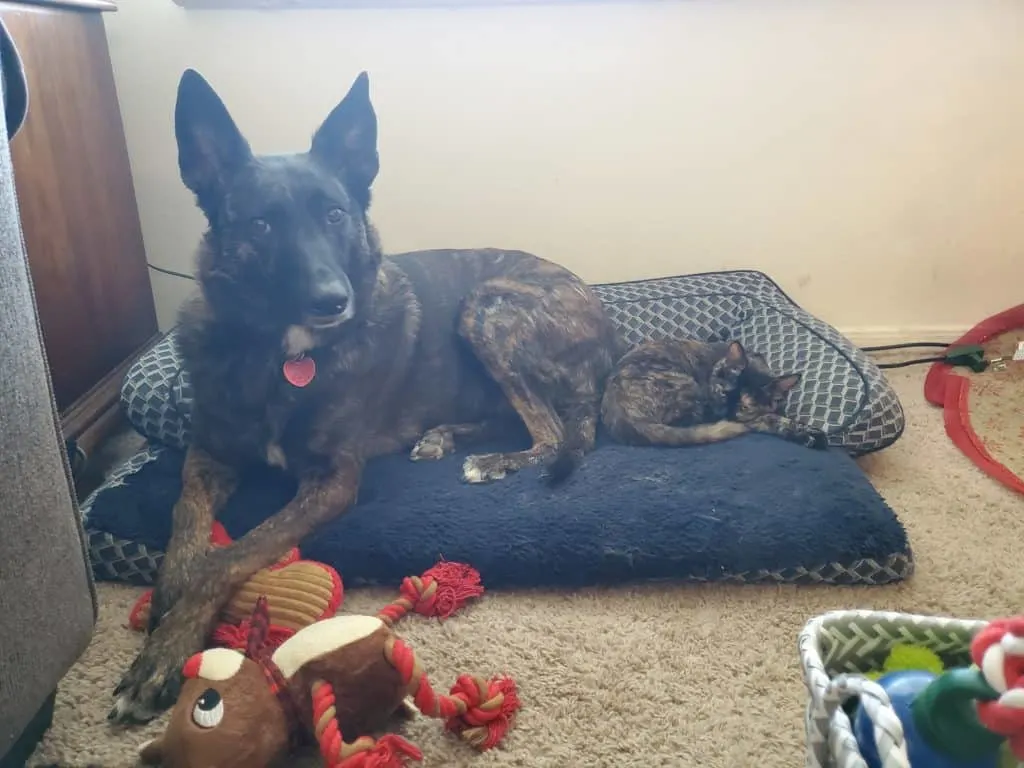
A Sweet Exception: Dutch Shepherd and Brindle Cat Become Besties
Happily, there can be exceptions to every traditional rule. Dutch Shepherds and cats are no exception to this.
This YouTube video highlights just how sweet it can be when a Dutch Shepherd and a cat become friends.
The owner doesn’t give us any back story to how the friendship developed, but comments from viewers reveal that the Dutch Shepherd in the story just turned one year old when the video was taken.
This means chances are good that the dog and the cat first met when the Dutch Shepherd was a much smaller, playful puppy and they bonded during that time.
However, for the safety of all animals in your family, it is always best not to count on the exception being true in your household.
Careful training and constant supervision can overcome many natural drives, but it doesn’t always work perfectly.
Dutch Shepherd Owners Talk About Dogs and Cats
In this Dutch Shepherd owner forum discussion thread, a new Dutch Shepherd owner who also owns cats asks for advice about whether the two will mix.
As you can see, the general advice is to not mix the two. Some experienced Dutch Shepherd owners go so far as to say that “anything that moves” is potentially a prey target for an adult Dutch Shepherd dog.
But here again, other owners bring up how there can be a natural difference in the degree of prey drive between different Dutch Shepherd dogs.
In other words, just because most Dutch Shepherds exhibit an unstoppably strong prey drive does not mean every Dutch Shepherd will come out this way.
Training and socialization are best accomplished in puppyhood and may overcome some natural instincts if the Dutch Shepherd in question also has a lower prey drive.
Teach Your Dutch Shepherd That Your Cat Is a Family Member
One possible training option that is mentioned is to socialize a Dutch Shepherd puppy to redirect their natural instincts away from seeing the family cat as prey and towards seeing the family cat as a sheep to be herded and protected.
It nearly goes without saying that this can take some expert training skills and you shouldn’t be afraid to reach out for help to keep your household safe for all!
As the North American Dutch Shepherd Rescue charity (NADSR) points out, this can be an effective technique to use for cats, other family dogs, and even kids.
In the short video you watched earlier, this may be why the Dutch Shepherd is sitting quietly by, simply watching the cat explore and play.
This type of behavior is actually in keeping with a Dutch Shepherd’s natural instinct to protect and guard their charges (even though their usual charges are people or farm livestock).
It certainly is worth a try if you are facing a difficult situation in your household between a cat and a Dutch Shepherd (or any other species of potentially vulnerable family pet).
It is especially important to think about this issue in advance if you are adopting a relinquished adult Dutch Shepherd, as these dogs have already matured into their full adult prey drive and may need an extra layer of training and socialization for safety.
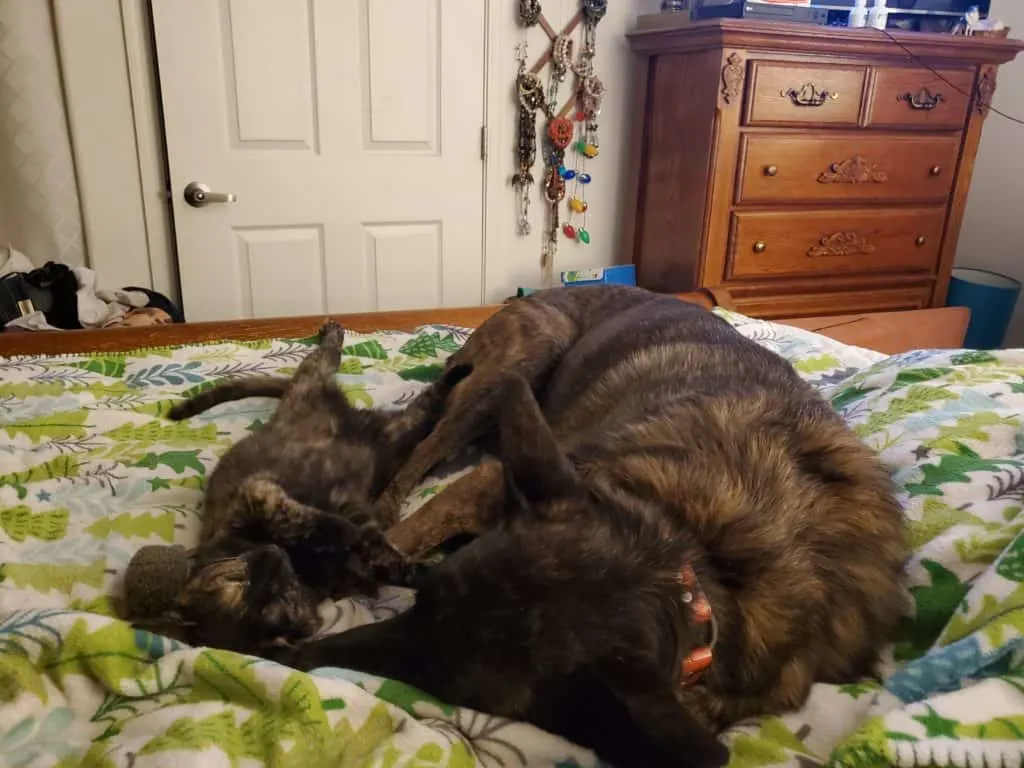
Dutch Shepherd Training Tips to Socialize Well With a Household Cat
You may find these additional Dutch Shepherd training and socialization tips to be helpful as you make those first critical introductions between your Dutch Shepherd and your cat.
1. Associate the “cat smell” with a welcome daily event in your dog’s life.
To do this, place your cat in a secure room with food, water, and other normal daily items like toys, cat trees, et al.
When your puppy’s mealtimes arrive, serve each one on the immediate opposite side of that door.
This will train your Dutch Shepherd that the smell of the cat is linked to their meal being served (as in, away from the idea that the cat could be their meal!).
2. Train your Dutch Shepherd puppy to not chase things, including toys or animals.
Part of the natural prey drive in a dog is to give chase. While this can be adorably cute when your dog is a puppy, it can be deadly as your Dutch Shepherd grows up.
Do your best to discourage chasing behavior across the board and choose playtime activities that don’t require any chasing behaviors.
3. When you bring your cat out of the room, socialize them while your dog is contained.
There is no way to fully predict in advance how your Dutch Shepherd might respond upon first sight of your cat.
This is why you always want to crate train your Dutch Shepherd before you host a meet-and-greet face to face.
Start with crated interactions and proceed to leashed interactions, offering rewards and time-outs as needed to reinforce calm behavior in your dog.
Have you had success socializing a dog with a high prey drive like the Dutch Shepherd to your family feline? We’d love to hear what worked for you – please share your tips in the comments.














